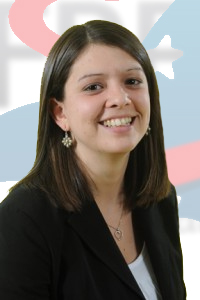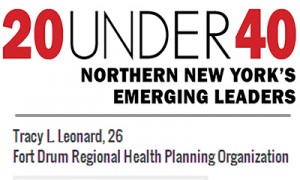
Tracy Leonard is a community member, professional, and scholar. As a graduate of both Jefferson Community College (’06) and SUNY Oswego (’08), where she received her Bachelors in Human Development, Leonard is also a legacy alumna continuing a tradition held by both of her parents as well as two of her four sisters.
She is currently the Regional Recruitment Program Manager at Fort Drum Regional Health Planning Organization, where she initially served as the Pipeline Outreach Coordinator.
In Leonard’s free time, she is a contributing writer for the Diocese of Ogdensburg North Country Catholic Newspaper and is on advisory boards of: Jefferson Community College Higher Education Center (JHEC) Partners in Education; Jefferson Community College Center for Community Studies; Diocese of Ogdensburg Catholic Charities; Greater Watertown Jaycees; and Tobacco Prevention Awareness Cessation Coalition (TPACC).
Leonard was named the 2010 Jefferson Community College Distinguished Rising Star Award recipient and in December 2012, among “20 Under 40” by Northern New York Business Magazine for her unparalleled community outreach efforts.

1. You started at Jefferson Community College and transferred to SUNY Oswego after two years. Where did you see yourself at age 30 before JCC, and then after SUNY Oswego?
While at Jefferson Community College, I had a growing passion for working with the elderly. My grandmother, who was in her late 90s, lived with my parents, siblings and me in her last few years of life. By assisting with her care, I was inspired to grow in love and appreciation for the wise, elder population in our community.
While attending SUNY Oswego, I participated in a service-learning program as a junior and senior and then in an internship program during my senior year capstone class. Placements for both programs were in settings that served the geriatric population (a nursing home and then an assisted living facility). My passion only grew through these experiences, thus defining my career goal: I longed to serve as a Senior Living Coordinator at an Assisted Living facility.
Community connections and various life experiences slightly altered those plans, thus leading me to the role I am in now as a Regional Recruitment Program Manager. I am not working specifically with the geriatric population, but with the health system that serves them.
2. As an adviser of many area organizations, is there a specific reason why you give so much back to the community?
In some way or another, all of us have relied on the communities we’re a part of for support at some point in our lives. And as such, we all have an obligation to find a way to give back to these communities in order to pass on the blessings we’ve been so fortunate to receive. I give back to my community because I feel it is the right thing to do in order to show my appreciation for all the things my community has given and continues to give to me. The contributions of others in my community have played a major role in helping me to achieve the successes I’ve seen; therefore, I consider reaching out and helping others offer a return of service.
Additionally, my love for learning new things and engaging with other members of my community is empowering. It helps me to make valuable and lasting community connections as well as build trust with others in my neighborhood. Involvement in these groups has become a part of my identity and is a source of personal fulfillment and pride. By donating a little time, resources, ideas or energy, I am assisting in improving the quality of life in my community. This personal commitment to engagement is hopefully influencing others to give back to their community as well and this collective effort will make our community a nicer place to live.
In conclusion, I am a young professional who seeks to rally with others who have shared passions resulting in greater benefit for the entire community.
3. What is a typical day like for you?
Each and every day brings a new adventure! A typical day consists of providing a platform to analyze the existing healthcare delivery options and seeking new opportunities for leveraging healthcare resources to carry out a regional healthcare approach to meet the needs of the expanding military and civilian population in the Fort Drum health service area; significantly strengthening the healthcare system. As a professional working in a healthcare planning organization such as the Fort Drum Regional Health Planning Organization, each day requires flexibility and adaptability.
The healthcare landscape is changing rapidly due to shifts in demographics, rising costs and policy changes; therefore, we are consistently evolving to meet regulatory, quality and care coordination requirements. In addition to this, our organization works in close collaboration with many community stakeholders such as hospital or higher education administration, clinical or non-clinical healthcare workers, private and non-profit practices, elected officials, soldiers, veterans, military dependents, high school students, post-secondary students, educators, community members, etc. We must be able to engage with each of these partners in order that we bring the greatest benefit to soldiers and their families and to the civilian population in the surrounding area.
4. How do you manage your schedule amidst your various positions throughout the community? What keeps you going?
Managing my schedule amidst various positions throughout the community requires time management, organization, self-knowledge and goals. Daily, I must develop a flexible schedule which allows me to maintain both professional and personal commitments. Many of the community organizations that I am involved in have a mission and goals which reflect those of my professional role and personal interests. When these align, it sometimes allows me the opportunity to engage with the community not only during leisure time, but also during work hours. My passion for new knowledge and my personal desire to give back to a community that has given me (and FDRHPO) so much is what encourages me to keep going.
5. Overall, how did your college education help prepare you for life and your career?
My experience in college not only prepared me for my career, it prepared me for life outside of my career. I gained skills that cannot be taught. Through interactions with fellow students, professors, internship supervisors, and co-workers, as well as other college staff, I earned not only a Bachelor’s degree in Human Development, but in people and social skills! I learned a lot about myself during my four years in college. I rose to success but I also faced challenges. I am confident that my passion and talent for networking and community health planning combined with the soft skills I acquired has enabled me to be successful in my current role as Regional Recruitment Program Manager at the FDRHPO.
Additionally, college helped me to see the importance and rewards of hard work, time management, collaboration and teamwork. It also helped me to understand that life is about having fun and balancing personal, academic and professional priorities.
6. What advice do you have to share with SUNY students?
If you are unsure of your academic program and future educational pathway, start exploring as soon as possible. Save yourself time and money by doing your research early on. Get involved, shadow, ask questions, seek guidance and find your passion through hands on exploration or experiences. Identify what makes you tick. Once you have this clearly defined, come up with a plan and strive to exceed personal goals and expectations. Take your studies seriously. Respect and strive to gain knowledge and learn life lessons from your personal, professional or academic mentors. Surround yourself with positive people who will help you to grow and mature to be a responsible, independent leader who achieves great things in your home, community and the world! Most importantly, the college years go by quickly—enjoy it and acknowledge it as a great opportunity and blessing.


Congratulations Tracy! You are an inspiration to many! God bless you in all that you do.